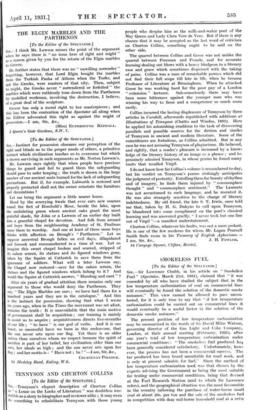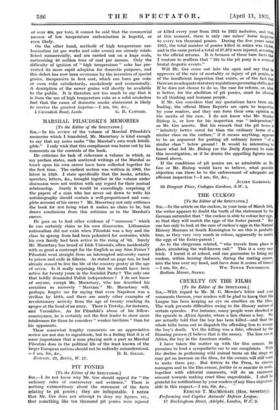SMOKELESS FUEL
[To the Editor of the SPECTATOR.] SIR,—Sir Lawrence Chubb, in his article on " Smokeless Fuel " (Spectator, March 21st, 1931), claimed that " it was conceded by all who have studied the subject that in the low temperature carbonization of coal on commercial lines will eventually be found the solution of the domestic smoke nuisance." This view cannot be allowed to pass uncon•. tested, for it is only true to say that " if low temperature carbonization could be carried out on commercial lines it would eventually be a useful factor in the solution of the domestic smoke nuisance."
The present position of low temperature carbonization may be summarized in the words of Sir David Milne Watson; governing director of the Gas Light and Coke Company, London, at their annual meeting (February, 1931), after one year's trial of low temperature carbonization under commercial conditions : " The smokeless fuel produced hay been generally considered satisfactory. Unfortunately, how- ever, the process has not been a commercial success. The tar produced has been found unsuitable for road work, and is only at present saleable for fuel." Since the method of low temperature carbonization used was that chosen by the experts advising the Government as being the most suitable for testing under commercial conditions, being that devised at the Fuel Research Station (and to which Sir Lawrence refers), and the geographical situation was the most favourable in the country (allowing the purchase of water-borne small coal at about 20s. per ,ton and the sale of the smokeless fuel in competition with dear rail-borne household coal at a price
of over 40s. per ton), it cannot be said that the commercial success of low temperature carbonization is hopeful, or even likely.
On the other hand, methods of high temperature car- bonization (at gas works and coke ovens) are already estab- lished commercially, and are carried out on a huge scale, carbonizing 40 million tons of coal per annum. Only the difficulty of ignition of " high temperature " coke has pre- vented its more rapid adoption for domestic purposes, and this defect has now been overcome by the invention of special grates, inexpensive in first cost, which can burn gas coke or oven coke satisfactorily, smokelessly and economically. A description of the newer grates will shortly be available to the public. It is therefore not too much to say that it is from the use of high temperature coke as a solid smokeless fuel that the cause, of domestic smoke abatement is likely to receive the greatest impetus.—I am, Sir, &c.,











































 Previous page
Previous page